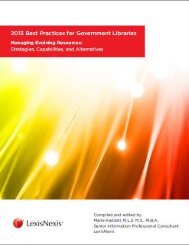2012 Best Practices for Government Libraries
2012 Best Practices for Government Libraries
2012 Best Practices for Government Libraries
You also want an ePaper? Increase the reach of your titles
YUMPU automatically turns print PDFs into web optimized ePapers that Google loves.
166<br />
BEST PRACTICES <strong>2012</strong><br />
individually on current services they provide and their perceived needs. The<br />
Interior Library did develop such a survey and sent it out to these library directors<br />
this past May. Tribal college and university library directors were asked <strong>for</strong> the<br />
following as part of the survey:<br />
A description of their user community<br />
A list of online subscriptions to e-book, journal, and reference and directory<br />
services and databases they offer<br />
A list of online subscriptions to e-book, journal, and reference and directory<br />
services and databases they would like to have<br />
Accessibility of online subscriptions beyond their library<br />
If they offer interlibrary loan services<br />
If they receive federal government documents as part of the GPO’s Federal<br />
Depository Library Program<br />
Subject areas in their print collection most utilized by their patrons<br />
Ways in which their library is limited in providing quality services to patrons<br />
A list of other resources (outside of online subscriptions) that their library<br />
could use<br />
As of this point, the Interior Library has received 13 completed surveys from tribal<br />
college and university library directors. The Interior Library is hoping to receive the<br />
additional surveys in the near future. Once all of the surveys have been received<br />
and reviewed, the Interior Library plans to contact each tribal college and university<br />
library individually to determine if an agreement can be reached to provide those<br />
needed services that the Interior Library might be able to provide.<br />
As part of this, the Interior Library would contact its database vendors and let them<br />
know which tribal college and university libraries are interested in databases<br />
already subscribed to by the Interior Library. The Interior Library will then see if<br />
their database vendors are able to partner with them to extend these database<br />
subscriptions to the tribal college and university library community at what is hoped<br />
would be little or no additional cost.<br />
This initiative on the part of the Department of the Interior has also been<br />
mentioned at recent meetings of the Federal Library and In<strong>for</strong>mation Network<br />
Advisory Board (FEDLINK). FEDLINK members representing other federal<br />
government libraries have indicated that they are interested in participating in this<br />
project in any way they can. Preliminary discussions have also included the<br />
possibility of tribal college and university libraries becoming pseudo members of<br />
FEDLINK and obtaining reduced FEDLINK pricing <strong>for</strong> the purchase of library services<br />
and subscriptions. Additionally, FEDLINK may look into the legalities involved with<br />
sending print materials weeded by federal libraries to those tribal college and<br />
university libraries that need those items, something currently restricted by existing<br />
regulations.<br />
While some surveys that have already been received have indicated support of<br />
tribal college and university libraries from their local university and state library<br />
networks, a number of others have shown that many of these libraries are still in



